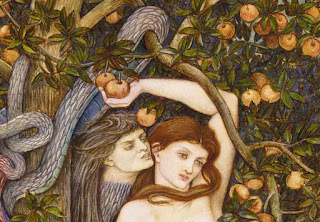Events are sometimes grand enough to take on a mythic
resonance that can be discerned even by those preoccupied by
profane matters. The Great Recession and its aftermath have been such events,
and a myth that captures those moments and their paradoxes is the Gnostic Hymn
of the Pearl. As I explain elsewhere, what we learned from the bursting
of the housing bubble is that Western economies are dominated by feckless
supervillains who retain their godlike plutocratic privileges even though they
don’t deserve to be worshiped by the herds of little people. The American and
European bankers led deregulation of the financial markets in 1990s (via lobbying, the revolving door, etc),
orchestrated the real estate fraud through financial scheming, won a
no-strings-attached, one-sided bailout through their capture of Obama’s
economics team, and subsequently pushed through austerity measures to further
squeeze the middle classes (via their think tanks' ideological capture of the neoliberals in government). Those bankers thus demonstrated that the Western
political and economic systems are corrupt in that they no longer serve the
interests of the majority of Western citizens. European countries such as
Greece, Italy, and Portugal revolted against their political Parties’ handling
of the European debt crisis.
But nowhere are the mythic proportions of the scandal more
apparent than in the American presidential campaigns. In both Parties, the
establishment is faced with insurgencies from political outsiders. Despite the
fact that the US leads the Western world in its enthrallment to market logic,
creating what Guy Debord called the society of the spectacle, a society in
which false realities or images rule by commodifying every aspect of social
life, that forlorn nation appears to be the site of a progressive revolution.
Whereas ordinarily the multitudes are blind to the corruption that’s become so
pervasive it’s been normalized, so that far from fighting for their political
rights, they cheer on figures who promise indirectly to further entrench the
oppressive social systems, as explained by Thomas Frank, American Democrats and
Republicans have now struck upon a populist language that can’t easily be
coopted by the deep state. This is the language based on the dichotomies of insiders
and outsiders, and of the corrupt establishment and the promise of renewal by
radically transforming the social systems. On the left, the solution is
democratic socialism, on the right it’s nativism, theocracy, or fascism.
As summarized by the Wikipedia article, the Hymn of the Pearl, found in the apocryphal Acts of Thomas, ‘tells the story
of a boy, “the son of the king of kings”, who is sent to Egypt to retrieve a
pearl from a serpent. During the quest, he is seduced by Egyptians and forgets
his origin and his family. However, a letter is sent from the king of kings to
remind him of his past. When the boy receives the letter, he remembers his
mission, retrieves the pearl and returns.’ In the ancient Jewish context, Egypt
stood for corruption, so the Egyptian seducers are the demonic archons who
serve as prison wardens, distracting us with sinful pleasures so that we’ll
lose our chance of enlightenment or gnosis. The Hymn is an allegory, the point
being that we’re all like that boy, lost in a profane world; we’ve forgotten
our true calling and our authentic ideals and must be reminded by an outsider.
In Gnostic systems, there’s often a transcendent redeemer emanating from the ineffable
ground of being, a prophetic saviour who informs us that we’re in the ultimate
bad news/good news situation: we’re imprisoned in the fallen natural universe
so that even our bodies lead us astray, but there’s a perfect, more real world
beyond which is our true home, and we can return to it by taking various
mystical or ascetic steps.
The Gnostic Connotations of the 2016 Democratic Campaigns
In the American presidential election, there are likewise
outsiders and insiders, transcendent redeemers and archons, angels of the Demiurge. Let’s begin with
the Democrats. Bernie Sanders’ entrance to the American mass media narrative
was delayed for months, because the corporate media, which serve up the
cultural spectacle, what Marx called the ideological superstructure that
explains away injustices in the economy, are of course part of the establishment.
The media establishment defends the status quo, putting systems before people,
whereas the predominant social systems are typically Trojan horses for natural hierarchies
and cycles, and people have the anomalous potential to transcend or subvert natural
processes. So Hillary Clinton was touted as a shoe-in for the Democratic
nominee, and the “free” world’s so-called leading nation was poised to welcome
another political dynasty. But Sanders was supported by a grass-roots movement,
fuelled in part by disappointment with Obama who had campaigned as a
transformative, Rooseveltian figure but had governed as a centrist, having
evidently fallen under the archons’ spell. Obama thus stands for John the
Baptist, Sanders for the Christ-like real deal, for the true, incorruptible
redeemer who will separate the wheat from the chaff, washing away the Egyptian
seducers, like Moses at the Red Sea. Having become too popular to ignore, the corporate
centers of infotainment ended their media blackout, opting for the standard
framing devices of a horse race or a boxing match between equals. In any case,
Bernie Sanders is still manifestly the outsider, the old, Jewish socialist who
takes no money from Wall Street and promises specific radical changes, such as
universal health care and education paid for by a tax on Wall Street
speculation so that Wall Street can return the favour and bail out the middle
class.






